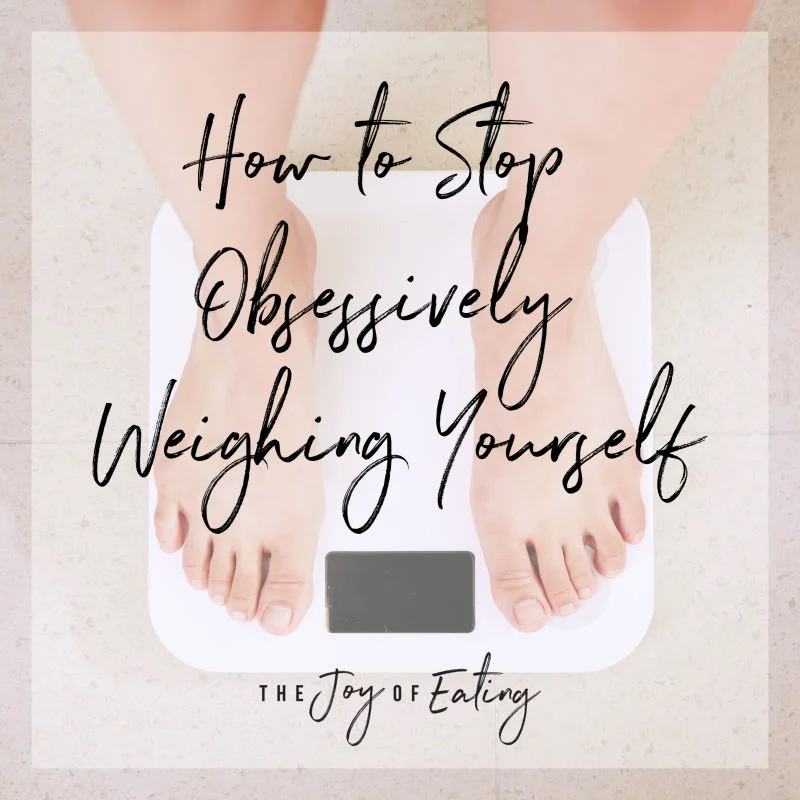As a non-diet dietitian, I’ve learned there’s a lot of questions and misconceptions about what we do that can make people afraid to reach out for help. Learn what to expect working with a non-diet dietitian in this article.
Read MoreBody image healing is a lifelong journey, not a thing that can be “fixed” with a body positive mantra or by choosing to love your looks. Still, if you’re a “homework” person, you might find it helpful to have specific exercises or activities to do for improving body image. This blog post shares five of my favorites!
Read MoreSet point weight theory is a helpful concept for understanding weight science, the fluctuations you experience in weight, “healthy weight,” and why diets don’t work. This blog post explains what set point weight range is and answers commonly asked questions about it.
Read MoreAs a non-diet approach, intuitive eating might seem like it’s not for people with diabetes, a chronic condition that (supposedly) must be managed with a strict diet. While intuitive eating for diabetes might look a little different, it’s still a tool you can use to take some stress out of managing diabetes and to help control blood sugar levels.
Read MoreThere’s a lot of people who connect with the body positivity movement, but wonder what to do if they’ve been told they have to lose weight for health reasons. If that’s you, read this article for some things to think about in deciding how to care for your body.
Read MoreBinge eating disorder is perhaps the most stigmatized and misunderstood of eating disorders, thanks to it’s association with higher weights and out of control eating. Read this post on five things to know about binge eating disorder so you can better understand this serious disorder, and it’s treatment.
Read MoreTrapped in a pattern of restricting and binging? The dieting pendulum analogy will help you understand the restrict-binge cycle, and give you tools for how to break free.
Read MoreWith intuitive eating growing in popularity and becoming, dare I say it, trendy, so has the number of providers co-opting intuitive eating to promote dieting. This post is for dietitians to learn more about why intuitive eating should NOT be used in weight loss counseling, and how doing so causes harm to the people intuitive eating was designed to help.
Read MoreAre you stuck in an unhealthy relationship with the scale? Weighing yourself frequently can contributes to an unhealthy relationship with food and your body, create stress, and frankly, isn’t even that accurate. Learn why you should get rid of your scale and tips for how to stop obsessively weighing yourself. Remember, you are so much more than a number!
Read MoreDiet advice is all about restriction and willpower. It tells you to “just say no” to all the foods you love and enjoy - no wonder so many people are trapped in a cycle or restriction and binging! If you’re wondering how to make peace with food and become a more intuitive eater, it starts with giving yourself permission to eat the foods you love.
Read MoreCurious about intuitive eating and not sure where to start? I’ve got ya! This post covers intuitive eating basics including the 10 principles of intuitive eating, myths and misconceptions, and how to get started with intuitive eating. It also has links to my most helpful intuitive eating blog posts, plus resources for where to learn more.
Read MoreThere are so many misconceptions about eating disorders, within dietetics, and in the general population, and that’s created a world that’s really dangerous for those with eating disorders or at risk. It prevents people both from asking for help when they need it, and receiving adequate care when they do.
Read MoreWeight science is SO much more complex than the fat = bad narrative you always hear. Body fat, or adipose tissue, is not this inert thing - it serves many roles in our body’s health and function. Read on to learn about the benefits of body fat, and how understanding it’s purpose can help you make peace with your body.
Read MoreAre you a dietetic intern or dietitian who is committed to HAES, but in an environment that isn’t? Read this guest post by dietetic intern Lauren Newman on how to deal with being a HAES informed dietetic intern, and work with dietitians and professors who may not know about Intuitive Eating and health at every size.
Read MoreLast week it was announced that Weight Watchers will be offering free memberships for teenagers age 13-17 starting this summer. I am horrified, so me and fellow non-diet dietitians and therapists are trying to wake up weight watchers and show them how much harm this will cause to teenagers, increasing the risk of both disordered eating and weight gain.
Read MoreIntuitive Eating is not letting yourself go. Along with body acceptance, intuitive eating is one of the most powerful acts of self care. By letting go of what you can't control (your weight), it gives you space to focus on what you can control - creating sustainable, health-promoting behaviors that nourish your healthiest self.
Read MoreAre you a dietitian interested in bringing non-diet approaches to your practice? Here's 10 tips for how to become an intuitive eating dietitian.
Read More

















